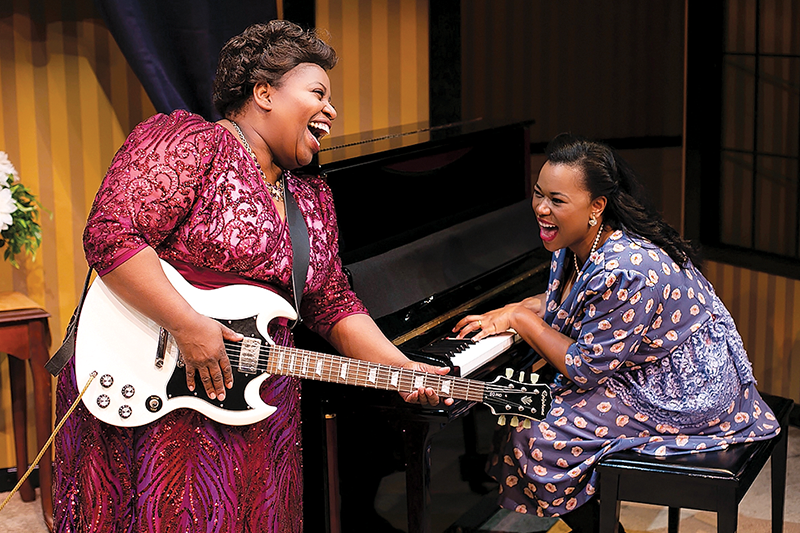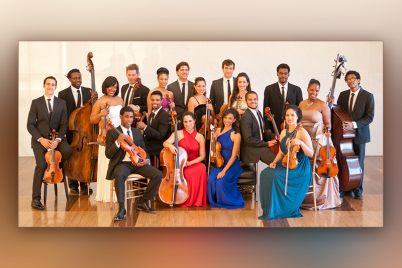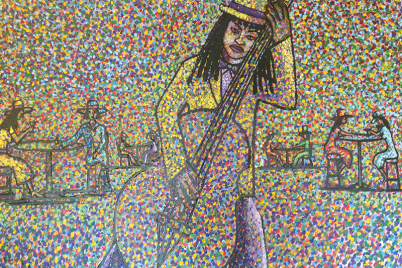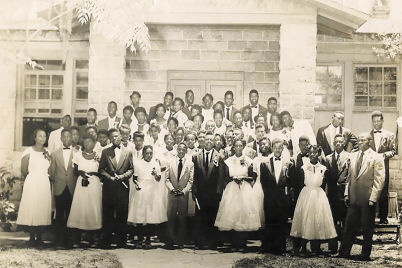By J.A. Jones, Staff Writer
ST. PETERSBURG – Playwright George Brant’s “Marie and Rosetta” at freeFall Theatre through Feb. 16 is a joyful examination of the musical genius and “mother” of rock and roll, gospel and blues – Sister Rosetta Tharpe – and her partnership with singer and pianist Marie Knight.
Directed by Lydia Fort, the production triumphs with lean production values, successfully highlighting the easy, humorous, and soulful portrayals of the play’s two characters by actors Illeana Kirven as Sister Rosetta and Hillary Scales-Lewis as Marie Knight. It deserves mention upfront that both actors sing and play piano and guitar themselves, lending to an authentic concert-feel throughout.
In her director’s note, Fort states, “Growing up, I knew that while Elvis was lauded as the progenitor of Rock ‘n’ Roll, Little Richard, and Chuck Berry were there leading the way in its nascent stage. It was a source of pride to know that African Americans had a significant impact in the birth of this remarkable musical genre. But now we know that Sister Rosetta Tharpe, a Black woman, was, in fact, the real pioneer of that guitar sound we know as Rock ‘n’ Roll.”
Kirven’s opening night performance was astonishing both because she had stepped into the role only four days earlier due to an emergency, as well as to her flawless performance of a lovely and gutsy Tharpe. She convincingly reveals Tharpe’s deeply held belief in both the power of gospel music alongside her insistence that joy is a vital component of communicating music’s God-given power.
Scales-Lewis’ performance of Marie Knight’s transformation from a humble gospel backup singer to Sister Rosetta’s piano-playing, co-vocalist is remarkable. It is through Knight’s obvious reluctance to “swing” – both her hips and on the piano — that we understand Tharpe’s dilemma as a church-raised musician with a rhythm and blues soul, who scared off much of her gospel following through her musical bravado. As the duet’s pianist, Scales-Lewis also played most of the evening’s music.
Kirven, as the guitar-wielding Tharpe, donned an electric guitar — that seemed as tall as she was — to strum and sing Tharpe’s first true popular crossover hit, “Strange Things Happening Every Day.” The first gospel to chart on Billboard’s Harlem Hit Parade, the song was considered by some to be the very first rock and roll recording and serves as Tharpe’s finale in the production.
The play deals head-on with the racism Tharpe and Knight experienced on the road, including southern cruelties such as being forced to sleep in funeral homes since Jim Crow’s abhorrent policies barred blacks from staying in hotels.
In fact, the entire play’s single set holds two caskets alongside the piano – symbolic not only of the dire circumstances which blacks of the period found themselves in, but also invoking the play’s deeper spiritual themes: heaven, or one’s “final resting place.”
However, the play’s light-hearted attitude towards men and husbands, or “squirrels,” seems to pass over the contemporary assertions of the love affair between Tharpe and Knight. Anyone who hadn’t read or known about the romance – an open rumor within the gospel world of the time – probably wouldn’t pick up any indication of sexual relations between the two.
Brant’s writing only alludes to Tharpe’s obvious attraction to Knight through general compliments about her beauty. It would probably necessitate prior knowledge of the suspected affair to read much into the production’s few moments of intense gazing, gentle hand-holding, and a kiss that, because of its timing, belies any clear reference to more than a close friendship.
The play refers to some of Tharpe’s real-life fans such as Elvis Presley and indicates that an up-and-coming Mahalia Jackson was waiting in the wings to steal Tharpe’s singular status as the most popular female recording star of her day.
Since the play’s 2016 premiere, Tharpe was posthumously inducted into the Rock ‘n’ Roll Hall of Fame in 2018. In recent years, much has been made of Tharpe’s impact on almost every recording giant that came alongside or after her, including Chuck Berry, Johnny Cash, Aretha Franklin, Little Richard and Eric Clapton, to name only a few.
Please hurry up and catch this easy-to-love evening of show-tapping sounds and delightful performances before it moves to Gainesville’ Hippodrome Theatre (which co-produced the play with freeFall)!
“Marie and Rosetta” is at freeFall Theatre, 6099 Central Ave., St. Petersburg, until Sunday, Feb. 16. Call 727-498-5205 or visit freefalltheatre.com.
To reach J.A. Jones, email jjones@theweeklychallenger.com








